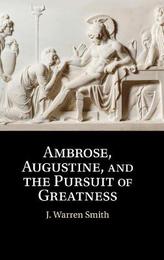
|
Ambrose, Augustine, and the Pursuit of Greatness
Hardback
Main Details
| Title |
Ambrose, Augustine, and the Pursuit of Greatness
|
| Authors and Contributors |
By (author) J. Warren Smith
|
| Physical Properties |
| Format:Hardback | | Pages:350 | | Dimensions(mm): Height 240,Width 160 |
|
| Category/Genre | Philosophy of religion
Theology |
|---|
| ISBN/Barcode |
9781108490740
|
| Classifications | Dewey:241.4 |
|---|
| Audience | | Professional & Vocational | |
|---|
| Illustrations |
Worked examples or Exercises; Worked examples or Exercises
|
|
Publishing Details |
| Publisher |
Cambridge University Press
|
| Imprint |
Cambridge University Press
|
| Publication Date |
10 December 2020 |
| Publication Country |
United Kingdom
|
Description
Since Aristotle, the concept of the magnanimous or great-souled man was employed by philosophers of antiquity to describe individuals who attained the highest degree of virtue. Greatness of soul (magnitudo animi or magnanimitas) was part of the language of Classical and Hellenistic virtue theory central to the education of Ambrose and Augustine. Yet as bishops they were conscious of fundamental differences between Christian and pagan visions of virtue. Greatness of soul could not be appropriated whole cloth. Instead, the great-souled man had to be baptized to conform with Christian understandings of righteousness, compassion, and humility. In this book, J. Warren Smith traces the development of the ideal of the great-souled man from Plato and Aristotle to latter adaptions by Cicero, Seneca, and Plutarch. He then examines how Ambrose's and Augustine's theological commitments influenced their different critiques, appropriations, and modifications of the language of magnanimity.
Author Biography
J. Warren Smith is Associate Professor of Historical Theology at Duke Divinity School. He is the author of Passion and Paradise: Human and Divine Emotion in the Thought of Gregory of Nyssa (2004) and Christian Grace and Pagan Virtue: The Theological Foundation of Ambrose's Ethics (2011).
Reviews'... Smith has made a useful contribution in a complex field. His book will be read with profit by students of Latin patristic ethics and its hinterlands.' Ivor J. Davidson, Scottish Journal of Theology
|